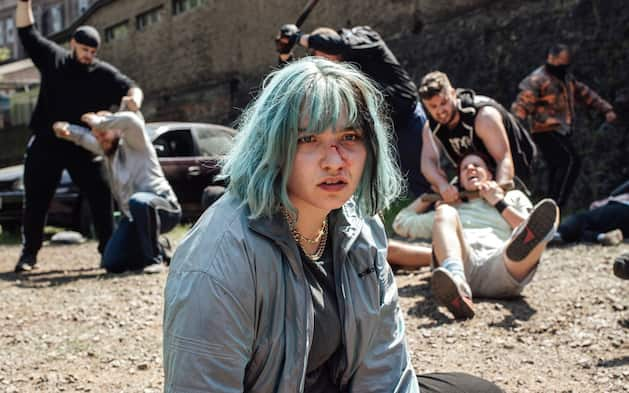In their fourth crime scene, the Saarbrücken investigators Schürk and Hoelzer had to delve deep into the hooligan scene. What are the “field matches” mentioned in the film all about? And why are they banned in Germany?
The murder of a student (Nils Bannert) led investigators Adam Schürk (Daniel Sträßer) and Leo Bäumer (Vladimir Burlakov) deep into the hooligan scene in “Tatort: The Cold of the Earth”. The fact that her colleague Esther Baumann (Brigitte Urhausen) was able to establish important contacts with football fans can be seen as a groundbreaking development in the Saarbrücken “Tatort” series, which has so far been quite male-dominated. After all, she and her colleague Pia Heinrich (Ines Marie Westernströer) played rather minor roles in the first three films. The linchpin of the murder case was a so-called “field match” for which the soccer hooligans from Saarbrücken and neighboring Kaiserslautern had arranged to meet. We explain what such meetings are all about and why they are banned in Germany.
Shortly after the soccer derby between the teams from Saarbrücken and Kaiserslautern, Andreas Schneider collapsed, covered in blood, in front of the entrance to the emergency room. The rescue attempts of the doctor on duty, Dr. Friedemann Lech (Till Butterbach) failed. Because the dead man had a skull fracture and a stab wound in his leg, the Saarbrücken criminal police took on the case. The investigation led the police into the private environment of the dead man, who was not only active as a hooligan but also had a number of private accounts to settle.
A large part of the injuries that Andreas Schneider had at the time of his death were due to a so-called “field match” between hooligans from Saarbrücken and Kaiserslautern. Months earlier, another participant (Tamer Tahan) had been seriously injured: Andreas, who is now dead, is said to have broken his eye. However, the corresponding procedure was discontinued.
Field matches are arranged fights between hostile hooligan groups. They often take place in remote places, such as in fields. In Germany they have existed since the 1990s. In the early years, more than 50 exclusively male fighters often took part. In the meantime, the parties often consist of ten to a maximum of twenty people. Women’s fights are mainly known from abroad, especially from Russia. The aim of a field match is to beat up the opposing group. A fight usually lasts one to two minutes and ends with a group mostly lying on the ground or fleeing voluntarily. If you’re on the ground, you can’t be hit any further according to the rules of the fight. However, the rules are implemented only rudimentarily.
Martial arts such as taekwondo or karate exist in Germany only as individual disciplines. However, the Federal Republic does not know any legal forms of group struggle. In a precedent from 2015, field matches were also criminalized by the Federal Court of Justice (BGH): The starting point of the proceedings was the conviction of five alleged right-wing extremist members of a former hooligan group from Dresden. In 2013, the Dresden Regional Court classified the group as criminal after they raided Turkish restaurants and took part in organized fights with other hooligans. The convicted men, four of whom had received prison sentences and one a fine, then appealed.
In the final BGH judgment it said: “Because the group of the accused was also geared towards committing assaults in the context of brawls, their purpose and activity was therefore to commit punishable (dangerous) bodily harm.” It made it loud Court, also made no difference whether the parties involved had given their consent to the expected violations or not.
The right-wing extremism expert Robert Claus considers the basic criminalization of group fights to be problematic, as he explained in an interview with the “Tagesspiegel” in 2018: “If people want to do martial arts, they should do it. But then, at best, technically correct and without involving bystanders,” he argues: “Due to the illegalization, people are hardly accessible to external influences. Few referees, hardly any doctors, no associations, no social workers. If you could work with those who fight there, you could try to ensure that the violence does not go beyond the scope of the matches work with the fans. In the martial arts stables, where hooligans spend a lot of time, there aren’t any.”
9.15 million people saw “Tatort: The Heart of the Snake”, the previous case of the Saarbrücken commissioners, in January 2022. With a market share of 27.1 percent, the thriller secured the day’s victory. Previously, “Tatort: Herr des Waldes” with 9.25 million viewers (market share: 26.3 percent) in April 2021 and “Tatort: Das fleißige Lieschen” with 10.44 million viewers (market share: 27 .5 percent) in April 2020 good odds. The fifth case involving commissioners Adam Schürk, Leo Bäume, Esther Baumann and Pia Heinrich is not expected until early 2024. Even if nothing is known about the plot so far, the two commissioners will certainly play bigger roles in it than was the case in the first of the four cases so far.
Djamila, Lucas and Gigi gave everything again on the last day in the camp. Ironically, however, Lucas, who got the most stars in the test, was the first to say goodbye. Djamila, on the other hand, initially got zero stars – and then the crown.
The I’m a Celebrity Get Me Out of Here show is the perfect opportunity for many celebs to top up their bankroll a little. However, it has only now been revealed that they themselves – if things go badly – have to dig deep into their pockets.
A sexist comment by Dieter Bohlen about DSDS candidate Jill Lange caused a scandal. RTL has since cut out the statement. But for the 22-year-old, not only Bohlen’s comments were out of place, but also those of his colleague Pietro Lombardi.
*The post “That’s why fights between hooligans are forbidden” is published by Teleschau. Contact the person responsible here.















